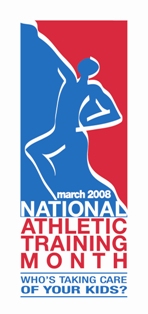NCAA News Archive - 2008
« back to 2008 | Back to NCAA News Archive Index
|
The NCAA News
The National Athletic Trainers’ Association (NATA) addresses challenges of understanding and working with athletes who have exhibited patterns of disordered eating in a position statement published this month in the Journal of Athletic Training.
The position statement provides recommendations to prepare athletic trainers, other health care providers, sports management personnel, coaches and parents for the challenges of disordered eating -- which can lead to a clinical diagnosis of anorexia nervosa or bulimia -- and identifies athletes who may be at risk.
It offers insight into the physical and mental health needs of athletes who suffer from the condition and provides guidelines for early detection and treatment, increased access to quality resources and educational programs for prevention.
The statement urges recognition of the signs and symptoms of disordered eating as early as possible, before it results in a variety of serious health consequences.
“It’s extremely important that athletes better understand sound nutritional practices, so they are better equipped to scrutinize their eating habits and make sure there is adequate energy available to compete at peak performance levels,” said the statement’s lead author, Tina M. Bonci, co-director of the division of athletic training/sports medicine for intercollegiate athletics at Texas and assistant director of athletics for sports medicine in the school’s women’s athletics.
“It’s definitely challenging for many athletes to maintain a positive energy balance over long periods of training with adequate amounts of food and nutrients, particularly alongside the goal of controlling body weight.”
Among the statement’s recommendations:
- Avoiding external pressure on athletes to lose weight is essential in preventing a preoccupation with dieting -- considered the most common trigger for disordered eating.
- Appreciate the potential for disordered eating in all sports -- not just those in which thinness is believed necessary to excel or those in which there are weight restrictions.
- Make education and behavioral programs widely available to help athletes readily talk about disordered eating, and to break down any fear, shame and guilt that may prevent athletes from seeking help.
- Establish a network of qualified and knowledgeable professionals who can skillfully handle interventions, provide care, institute screening measures for early detection and develop educational initiatives for prevention.
Publication of the statement comes as the 30,000-member NATA observes National Athletic Training Month during March. The theme for the observance is “Who’s Taking Care of Your Kids?”

